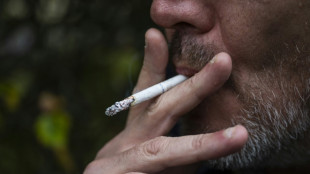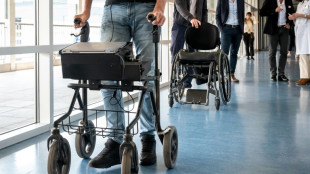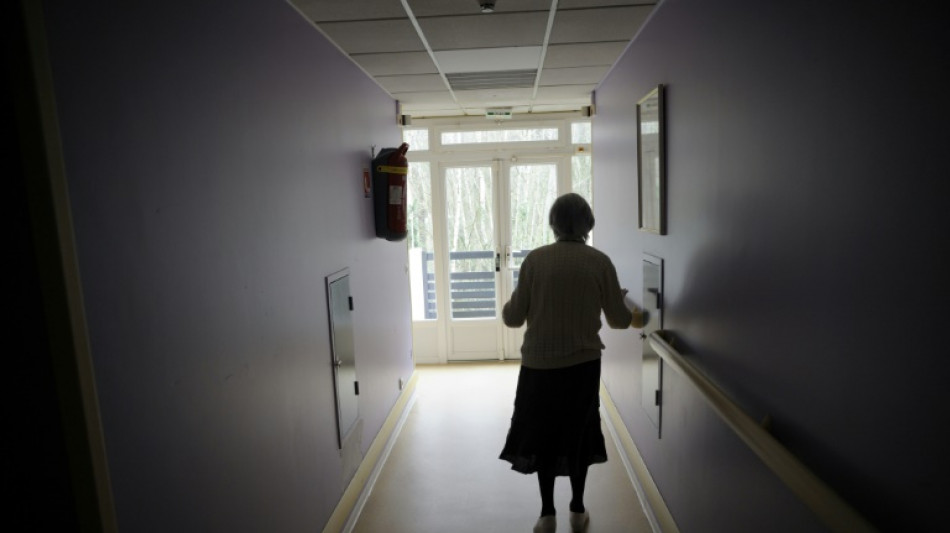
-
 Iran Nobel winner released for three weeks, 'unconditional' freedom urged
Iran Nobel winner released for three weeks, 'unconditional' freedom urged
-
Red Cross marks record numbers of humanitarians killed in 2024

-
 Johnson's Grand Slam 'no threat', says World Athletics boss Coe
Johnson's Grand Slam 'no threat', says World Athletics boss Coe
-
Qatar's emir and UK's Starmer talk trade as state visit ends

-
 Cuba suffers third nationwide blackout in two months
Cuba suffers third nationwide blackout in two months
-
Russia, Ukraine to send top diplomats to OSCE summit in Malta

-
 Spanish royals to attend memorial service for flood victims
Spanish royals to attend memorial service for flood victims
-
LPGA, USGA new policy requires female at birth or pre-puberty change

-
 Stick to current climate change laws, US tells top UN court
Stick to current climate change laws, US tells top UN court
-
British Museum chief says Marbles deal with Greece 'some distance' away

-
 Pope Francis receives electric popemobile from Mercedes
Pope Francis receives electric popemobile from Mercedes
-
Gaza civil defence: thousands flee Israeli strikes, evacuation calls

-
 Trump names billionaire private astronaut as next NASA chief
Trump names billionaire private astronaut as next NASA chief
-
Pidcock to leave INEOS Grenadiers at end of season

-
 Seoul stocks weaken, Paris advances despite political turmoil
Seoul stocks weaken, Paris advances despite political turmoil
-
South America summit hopes to seal 'historic' trade deal with EU

-
 DAZN awarded global TV rights for Club World Cup
DAZN awarded global TV rights for Club World Cup
-
Top executive shot dead outside New York hotel

-
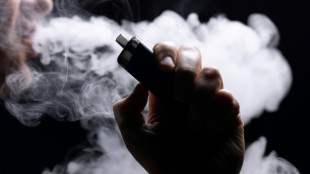 Vaping while still smoking unlikely to help quitters: study
Vaping while still smoking unlikely to help quitters: study
-
British Museum chief says Parthenon Marbles deal with Greece 'some distance' away

-
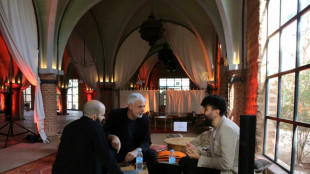 'Creating connections': Arab, African filmmakers gather at Morocco workshops
'Creating connections': Arab, African filmmakers gather at Morocco workshops
-
Iran frees Nobel winner for three weeks, sparking calls for 'permanent' release

-
 Brazil's Minas cheese gets added to UNESCO list
Brazil's Minas cheese gets added to UNESCO list
-
Top US executive shot dead in New York City: media

-
 Trump's nominee to run Pentagon hangs by a thread
Trump's nominee to run Pentagon hangs by a thread
-
GM announces more than $5 bn hit to earnings in China venture

-
 World chess champ Ding, teen challenger tied past halfway mark
World chess champ Ding, teen challenger tied past halfway mark
-
Georgia police raid opposition offices as PM vows to curb protests

-
 S. Korea opposition begins push to impeach president
S. Korea opposition begins push to impeach president
-
Syrian army fights rebel offensive with counterattack

-
 France court upholds Polanski acquittal in defamation case
France court upholds Polanski acquittal in defamation case
-
UK bans daytime TV ads for cereals, muffins and burgers

-
 Palace's Guehi to face no formal action over 'Jesus' message on rainbow armband
Palace's Guehi to face no formal action over 'Jesus' message on rainbow armband
-
UK faces trade balancing act with Trump, EU

-
 Iran releases Nobel Peace laureate Mohammadi on medical leave: lawyer
Iran releases Nobel Peace laureate Mohammadi on medical leave: lawyer
-
UNESCO grants heritage status to Aleppo soap as Syria war flares

-
 Ghana's illegal mining boom seeps into presidential election
Ghana's illegal mining boom seeps into presidential election
-
Inconsistent Spurs 'progressing in all aspects': Postecoglou

-
 France's Orano says Niger junta controls uranium firm
France's Orano says Niger junta controls uranium firm
-
Seoul stocks weaken, Paris edges up tracking political turmoil

-
 China reports warmest autumn since records began
China reports warmest autumn since records began
-
French marine park to close over law banning killer whale shows

-
 Thousands march demanding S. Korea president resign over martial law debacle
Thousands march demanding S. Korea president resign over martial law debacle
-
Taiwan romance novelist Chiung Yao dies at 86

-
 In Angola, Biden promises to invest differently to China
In Angola, Biden promises to invest differently to China
-
Syrian army launches counteroffensive against rebels

-
 Evenepoel says 'long journey' ahead after postal van collision
Evenepoel says 'long journey' ahead after postal van collision
-
South Korea's day of rage as Yoon's martial law founders

-
 UK police question killer nurse Letby over further baby deaths
UK police question killer nurse Letby over further baby deaths
-
Cameroon curator Kouoh is first African woman to lead Venice Biennale


Many dementia cases could be prevented, but far from all: study
Millions of cases of dementia could be prevented or delayed by reducing a range of risk factors such as smoking or air pollution, according to a major new study, though outside experts warn that such measures can only go so far.
The debilitating condition, which progressively robs people of their memories, cognitive abilities, language and independence, currently affects more than 55 million people across the world.
Dementia is caused by a range of diseases, the most common of which is Alzheimer's.
A huge review of the available evidence published in The Lancet journal on Wednesday said that the "potential for prevention is high" in the fight against dementia.
The study follows a previous report in 2020 that also emphasised the importance of prevention.
At the time, the international team of researchers estimated that 40 percent of dementia cases were linked to 12 risk factors.
The factors included people having a lower level of education, hearing problems, high blood pressure, smoking, obesity, depression, physical inactivity, diabetes, excessive drinking, traumatic brain injury, air pollution and social isolation.
The latest update adds two more risk factors: vision loss and high cholesterol.
"Nearly half of dementias could theoretically be prevented by eliminating these 14 risk factors," the study said.
- EU turns down new drug -
Decades of research and billions of dollars have failed to produce a cure or truly effective drug for dementia.
But since the start of last year, two Alzheimer's treatments have been approved in the United States: Biogen's lecanemab and Eli Lilly's donanemab.
They work by targeting the build-up of two proteins -- tau and amyloid beta -- considered to be one of the main ways the disease progresses.
However, the benefits of the drugs remain modest, they have severe side effects, and they are often very expensive.
In contrast to the US, the European Union's medicine watchdog last week refused to approve lecanemab, and it is still considering donanemab.
Some researchers hope the fact that the new drugs work at all means they will pave the way for more effective treatments in the future.
Others prefer to focus on ways to prevent dementia in the first place.
Masud Husain, a neurologist at the UK's University of Oxford, said that focusing on risk factors "would be far more cost effective than developing high-tech treatments which so far have been disappointing in their impacts on people with established dementia".
- 'How much more could we do?' -
The Lancet study was welcomed by experts in the field, among whom the importance of prevention is hardly debatable.
However, some said the idea that nearly half of all dementia cases could be prevented should be put in perspective.
It has not been proven that the risk factors directly cause dementia, as the authors of the study acknowledged.
For example, could it be dementia that is causing depression, rather than the other way around?
It is also difficult to separate the risk factors from each other, though the researchers tried.
Some could be intrinsically linked, such as depression and isolation, or smoking and high blood pressure.
Above all, many of the risk factors are societal scourges that have long proven near impossible to fully address.
The study lays out different recommendations ranging from the personal -- such as wearing a helmet while cycling -- to governmental, such as improving access to education.
"It is not clear whether we could ever completely eliminate any of these risk factors," Charles Marshall, a neurologist at Queen Mary University of London, told AFP.
"We already have public health programmes to reduce smoking and hypertension (high blood pressure), so how much more could we do?"
Tara Spires-Jones, a neuroscientist at the University of Edinburgh, said it was important that "we do not blame people living with dementia for their brain disease".
That is because "it is clear that a large portion of dementias could not be prevented due to genes and things beyond people's control, like opportunities for education as children", she added.
G.Schulte--BTB

